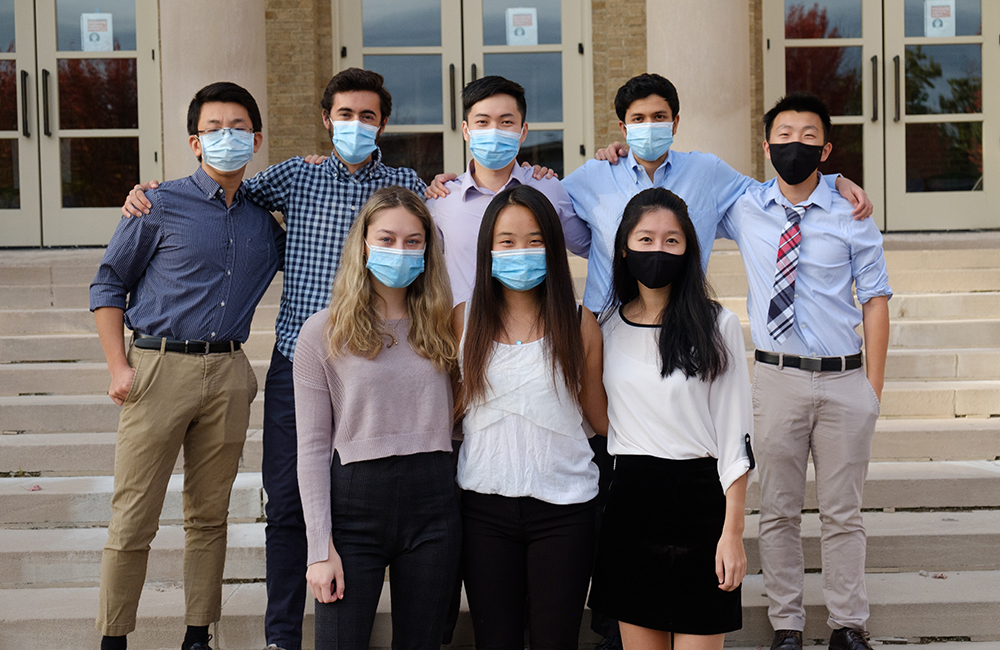Vita Innovations, a Cornell University student startup creating functional biomedical wearables, is here to change the game in emergency medicine by combatting the impacts of emergency department overcrowding.
Founded by a group of Cornell students passionate about biomedical engineering, the concept for the startup’s flagship product, VitalMask, was developed in under 48 hours during Cornell’s 2020 AI Health Hackathon. Ever since winning the grand prize and $2,500 in funding at the hackathon, Vita Innovations has been on a winning streak.
The startup took third place in IBM’s Coronavirus Challenge and first place at both the Cornell Entrepreneurship Kickoff and the Business Today International Impact Challenge. As a member of the 2020-2021 eLab cohort, Vita Innovations was recognized as the 2021 Student Business of the Year at the Entrepreneurship at Cornell conference.
Designed early into the COVID-19 pandemic, VitalMask is a health wearable intended to combat the negative outcomes of emergency room overcrowding, including increased walkouts, unnoticed progression of illness, and fatalities. In the wake of COVID-19, these effects were greatly exacerbated, and concerned 92% of the physicians that Vita Innovations spoke to while conducting customer discovery during eLab.
Not only does the cleanable and reusable mask prevent the spread of respiratory diseases like COVID-19, the biosensors in the mask monitor patient vital signs, including temperature, blood oxygen levels, heart rate, and respiratory rate. The vitals are then transmitted via Bluetooth to a dashboard on a desktop or mobile app where they can be viewed by medical professionals, alerting them to emergencies and allowing for patients to be monitored before they are even admitted.
Vita Innovations is currently comprised of founders Longsha Liu ’20, CEO, Ray Wei ’21, and Kristen Ong ’21 as well as team members Julia Isakov ‘21, Sarah Luo ‘20, Daniel Stabile ’21, and Borna Naderi ’22.
“VitalMask was inspired by the countless unattended patients that I witnessed waiting hours to be boarded in an overcrowded emergency department. Although I could support them as a volunteer by providing pillows, a cup of water, or words of comfort, I wanted to do more,” said Liu.
“The overwhelming support and feedback we received shed light on our potential to make a difference in the lives of patients and medical personnel around the world.”
Vita Innovations turned to eLab for support as they began working toward bringing VitalMask to market. With the guidance of eLab’s instructors and mentors, the startup was able to accelerate this work by determining their value proposition, creating a pitch deck, and conducting customer discovery interviews.
“Being a founder can often feel very daunting, but eLab has a wealth of resources and mentors to provide some structure and insights, respectively, for the early part of our journey,” said Isakov, the team’s CFO.
“Beyond the incredible mentorship, the greatest benefit our team received from eLab was a community of student entrepreneurs. It was a great bonding experience participating in negotiation exercises together, listening to each other’s pitches, and seeing the growth of each team throughout the year.”
While VitalMask was initially developed for use in emergency rooms during COVID-19, Vita Innovations has plans to apply their work to a variety of healthcare situations. They envision their technology easily capturing real-time patient data and reporting that data to their software for data analysis and prioritization as a main value proposition for the company. They are currently looking to expand their team to include a machine learning specialist and an electrical engineer.
“While COVID-19 propelled VitalMask into the spotlight, we intend for the technology—especially for its underlying software—to exist far beyond the pandemic, and to synergize with uses where masks are established and with diagnostic features,” Liu said.

